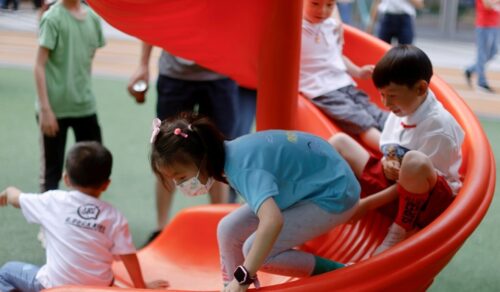Starting from the fall semester of 2025, China will implement a nationwide policy to exempt childcare and education fees for children in the final year of kindergarten, covering both public and private institutions in urban and rural areas.
Announced at a State Council policy briefing, the initiative is expected to benefit around 12 million children this fall alone, with government spending increasing by 20 billion yuan to offset household education costs, marking a significant step toward making preschool education more accessible, equitable, and affordable across the country.
On August 7, Vice Minister of Finance Guo Tingting said at a press briefing that the policy of exempting childcare and education fees covers all age-appropriate children in the senior class of kindergartens, and this includes public and private kindergartens, as well as those in urban and rural areas, ensuring that all children attending senior kindergarten classes can benefit from this policy
It is estimated that around 12 million children will benefit during the fall semester this year, said Guo.
Guo further explained that childcare and education fees account for a significant part of household preschool education expenditures, and once these fees are waived, families’ education expenses will be effectively reduced.
For this fall semester alone, national fiscal expenditure will increase by about 20 billion yuan, which will reduce household expenditure by 20 billion yuan, and if calculated on an annual basis for the next year, this figure will be 40 billion yuan, said Guo.
“The policy will begin by waiving childcare and education fees for senior kindergarten classes to ensure sustainability. In the future, further research will be conducted to improve policy measures so that more children can enjoy the benefits of the policy,” according to Guo.
He noted that the subsidy will be jointly borne by the central and local governments, with the central government taking the main share and tilting support toward central and western regions, and local governments will coordinate central subsidies with their own financial resources to ensure timely and full allocation of funds.
Xu Liuqing, Director of the Department of Science, Education, and Culture at the Ministry of Finance, said at the briefing that the Ministry has already arranged for the central government to bear the subsidy funds for the exemption of childcare and education fees, which will be allocated soon.
At the same time, local governments are being guided to promptly formulate detailed implementation measures, and each province is to refine its financial subsidy standards based on local conditions and expedite the development of specific implementation plans, said Xu.
Liu Yuguang, Director of the Department of Finance at the Ministry of Education, said that since 2011, local governments, following the principle of local responsibility with central support, have gradually established a preschool education funding system primarily supported by government funding, with assistance from kindergartens and social contributions. T
The Ministry of Education will guide local governments to consider factors such as demographic changes and local fiscal capacity to further improve support policies for economically disadvantaged families, and meanwhile, the Ministry of Finance and the Ministry of Education will study and establish a unified support policy for economically disadvantaged children at an appropriate time, according to Liu.
The State Council recently issued the Guidelines on Gradually Promoting Free Preschool Education, aimed at advancing the universal, inclusive, safe, and high-quality development of preschool education.
The Guidelines clarify that starting from the fall semester of 2025, childcare and education fees will be waived for children in the final year of public kindergartens. The exemption standard will be based on the approved fee rates for public kindergartens (excluding meal fees, boarding fees, miscellaneous fees, etc.) by the local governments at or above the county level and their education and pricing departments.
For children attending private kindergartens approved by education authorities, the fees will be waived or reduced by referring to the exemption level of similar public kindergartens in the same area. If the childcare and education fees in private kindergartens exceed the exemption level, the kindergartens may continue to charge the families the excess amount as per regulations. For the income shortfall faced by kindergartens due to the exemption of these fees, the financial departments will provide subsidies based on factors such as the number of children benefiting from the exemption and the actual per-student fee levels in the area.
The Guidelines encourages provinces to further consolidate and implement support policies for economically disadvantaged children, orphans, and children with disabilities, ensuring a comprehensive safety net. At the same time, full implementation of the Preschool Education Law of the People’s Republic of China is required, adhering to the principles of ensuring basic needs and inclusive services, and further improving the preschool education investment mechanism.
The Guidelines require local financial and education departments at all levels strengthen daily monitoring, reinforce funding guarantees and usage management, and ensure timely and full allocation of funds to maintain normal kindergarten operations. Delays in paying teacher salaries are strictly prohibited. Local education departments must strictly fulfill their regulatory responsibilities, standardize kindergarten operations, and effectively safeguard the physical and mental well-being of children attending kindergartens.

